- Quick Read
- Deep Read ( 14 Min. )

Why is Christian Science in our name?
Our name is about honesty. The Monitor is owned by The Christian Science Church, and we’ve always been transparent about that.
The Church publishes the Monitor because it sees good journalism as vital to progress in the world. Since 1908, we’ve aimed “to injure no man, but to bless all mankind,” as our founder, Mary Baker Eddy, put it.
Here, you’ll find award-winning journalism not driven by commercial influences – a news organization that takes seriously its mission to uplift the world by seeking solutions and finding reasons for credible hope.
Explore values journalism About usIn Today’s Issue
- Politics roiled a community. It worked to rebuild trust with trash and flowers.
- Today’s news briefs
- Attack on Slovakia’s prime minister points to a broader challenge for Europe
- On Ukraine’s battlefields, this group respects fallen soldiers – no matter which side
- A House committee investigates COVID. Surprisingly, it’s making headway.
- Add the Monitor’s 10 best books of May to your reading list
Monitor Daily Podcast
- Follow us:
- Apple Podcasts
- Spotify
- RSS Feed
- Download
TODAY’S INTRO
When communities decide to heal
Trust doesn’t always come easy. It can come to those who choose to build it.
Stephen Humphries and Alfredo Sosa collaborated on a story that’s a tale of traffic cones and trash bags. More deeply, it’s about respect, purpose, and a shared sense of home – all humbly aimed at healing the kind of community division that feels pretty common today. If there’s a “poster story” for our ongoing project, Rebuilding Trust, this is probably it.
“These volunteers don’t put a high premium on power, status, or money,” Stephen says. As one social-trust tracker told him, “‘The relationships are the riches.’”
Share this article
Link copied.

Help fund Monitor journalism for $11/ month
Already a subscriber? Login

Monitor journalism changes lives because we open that too-small box that most people think they live in. We believe news can and should expand a sense of identity and possibility beyond narrow conventional expectations.
Our work isn't possible without your support.
A deeper look
Politics roiled a community. It worked to rebuild trust with trash and flowers.
It’s an old story: The nation is politically divided. But one U.S. community is trying to rebuild civic trust one volunteer at a time.
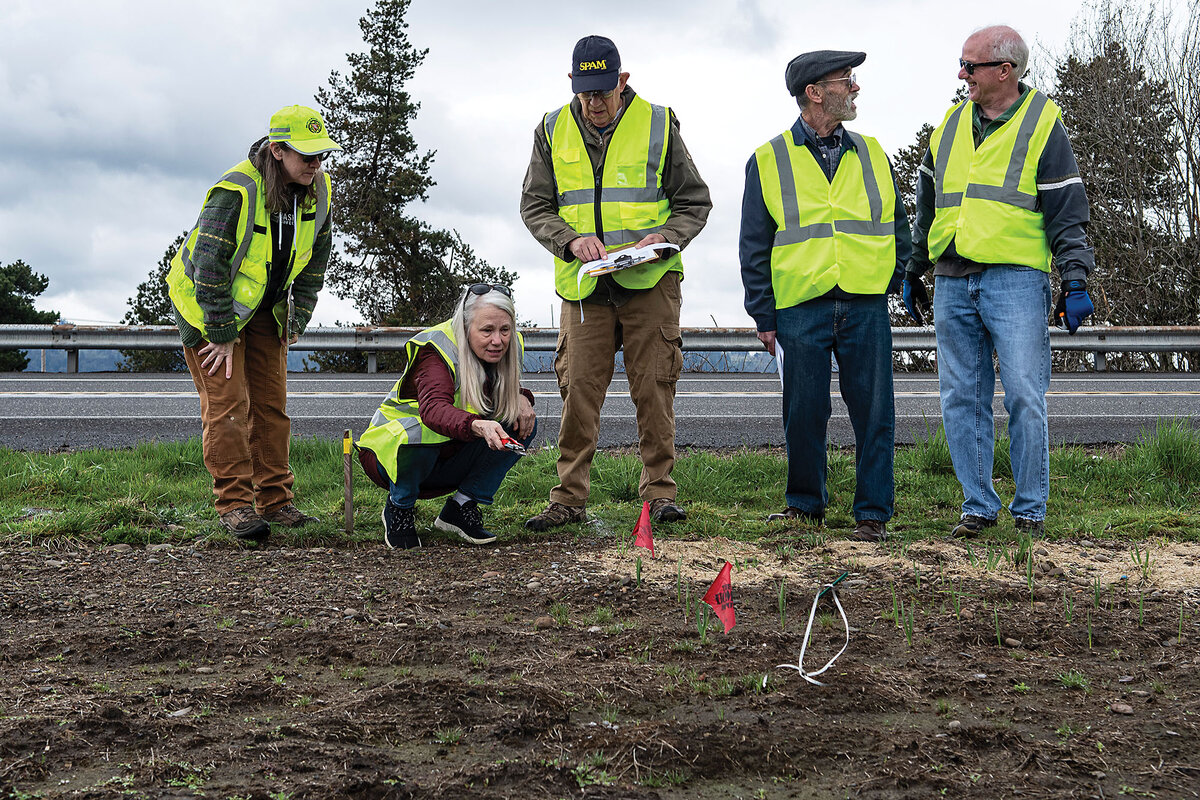
-
Alfredo Sosa Staff photographer
Barbara Seaman apologizes that her minivan smells like pork as she drives around the conjoined towns of Washougal and Camas in Washington. She had just transported braised barbecue to ReFuel Washougal, a program that serves free meals to homeless people.
With her is Melanie Wilson, who gets it. “If you were in my car, it’d be full of traffic cones and trash bags and trash,” she says. “This is what community-building looks like. It doesn’t look like fancy discussions about policy.”
Both community builders had been taken aback by the civic vitriol that seemed to be tearing their towns apart. Controversies about pandemic restrictions, Black Lives Matter, and other culture war issues had become flashpoints for violent rhetoric.
So they and other residents built an alliance to foster trust in their communities. People decided they were done focusing so intensely on politics. Instead, they agreed to pick up trash, plant wildflowers, and try to make life easier for disadvantaged people.
It’s in service of an underlying mission: Get people out of their partisan bubbles and put them to work, together toward a shared goal.
“I’m so sick and tired of everybody labeling everybody,” says Ms. Seaman. “I just want to get people together to build relationships.”
Politics roiled a community. It worked to rebuild trust with trash and flowers.
Before the troubles started, Melanie Wilson believed she’d finally found paradise.
She and her husband had moved from Washington, D.C., to Washougal, Washington, in 2019. After the cacophonies of the U.S. capital, they immediately felt at home with tranquil views of the mountains, including the snowcapped peak of Mount Hood in the Oregon distance. Lewis and Clark once camped here on the banks of the Columbia River over two centuries ago. The pace of life here is as unhurried as the logging barges wending through its gorge.
“I’ve been looking for a home my whole life,” Ms. Wilson says of the town of 17,000 people. “I want to make friends here. I want to put down roots here.”
That was five years ago. Then the pandemic hit in March 2020. Two months after that, George Floyd was murdered by Minneapolis police. And the Wilsons’ paradise, it seemed, suddenly erupted into the kind of rancor they thought they had left in Washington, D.C.
Protests sprang up in the conjoined towns of Washougal and Camas that summer. By August, pro-police rallies were attracting hundreds of supporters waving American flags in support of law enforcement. On opposite sides of the street, half as many counterprotesters hoisted Black Lives Matter signs in a clash of highly charged remonstrations.
The area has been called the “crossroads to discovery.” Today both towns are at the crossroads of America’s deepening political and cultural divides. The bedroom communities are just a 30-minute drive west from progressive Portland, Oregon. A few miles to the east, however, horses, cows, and alpacas graze on gentle swells of verdant farmland, scattered with barns and houses displaying enormous signs supporting Donald Trump.
The protests in Washougal and Camas were mostly peaceful. Mostly. The police broke up a couple of push-and-shove scuffles. Demonstrators in pandemic masks chanted “I see a racist” at Trump supporters. In one instance, a man driving past the Black Lives Matter protesters threw coffee out the window, drenching an older woman. Some protesters displayed Confederate battle flags. One showed up with a semiautomatic rifle.

Ms. Wilson was getting increasingly worried. Then, at a school board meeting in 2021, the vitriol she’d been witnessing reached a tipping point, jolting the sense of home that had become so important to her life.
During the meeting, a man stood up and jabbed his finger at the elected officials sitting in front of them. “‘Civil war is almost here. We’re sharpening our bullets,’” Ms. Wilson recalls the man saying. “‘Do you people really think you’re going to win it, the war?’”
She was startled once again by the crowd’s response. “People around the room clapped and stamped their feet on the floor,” she says. “It seemed to me, that’s a flashing red warning in a community.”
After the meeting, she began talking to others in the community about the violent rhetoric. She joined a group of citizens in Washougal and Camas to think about how to counter the civic vitriol that seemed to be tearing their community apart.
Over time, she conceived a simple idea: People would gather to pick up trash, together.
Today, Ms. Wilson is the co-founder and executive director of the East County Citizens’ Alliance. Its volunteers don’t chant and shout. They don’t tote signs and megaphones, let alone AR-15s. What they do carry, however, are seedlings, paintbrushes, and trash bags. One volunteer even brings his tractor.
The organization engages in other projects, too, from feeding the hungry to mentoring students. It’s all in service of an underlying mission: Getting people out of their news silos and partisan bubbles to gather together outside – their outside, their gorgeous, scenic, pastoral part of the world – and make an effort to work together and get to know each other.
This idea, too, is simple: To fix our politics, we must first mend our culture.
There are groups like Ms. Wilson’s springing up all over America, in fact. From Wilkesboro, North Carolina, to Madison, Wisconsin, to Compton, California, small bands of volunteers are working to improve their quality of life, not only in their neighborhoods, but also in their hearts.
There’s little glory in it. Sometimes, volunteers may even wonder if they’re making any progress at all. But with each small act of kindness, they’re working to weave a social fabric of grace, stitch by stitch, and rooted in tolerance, respect, and faith in each other, as different as that other may be.
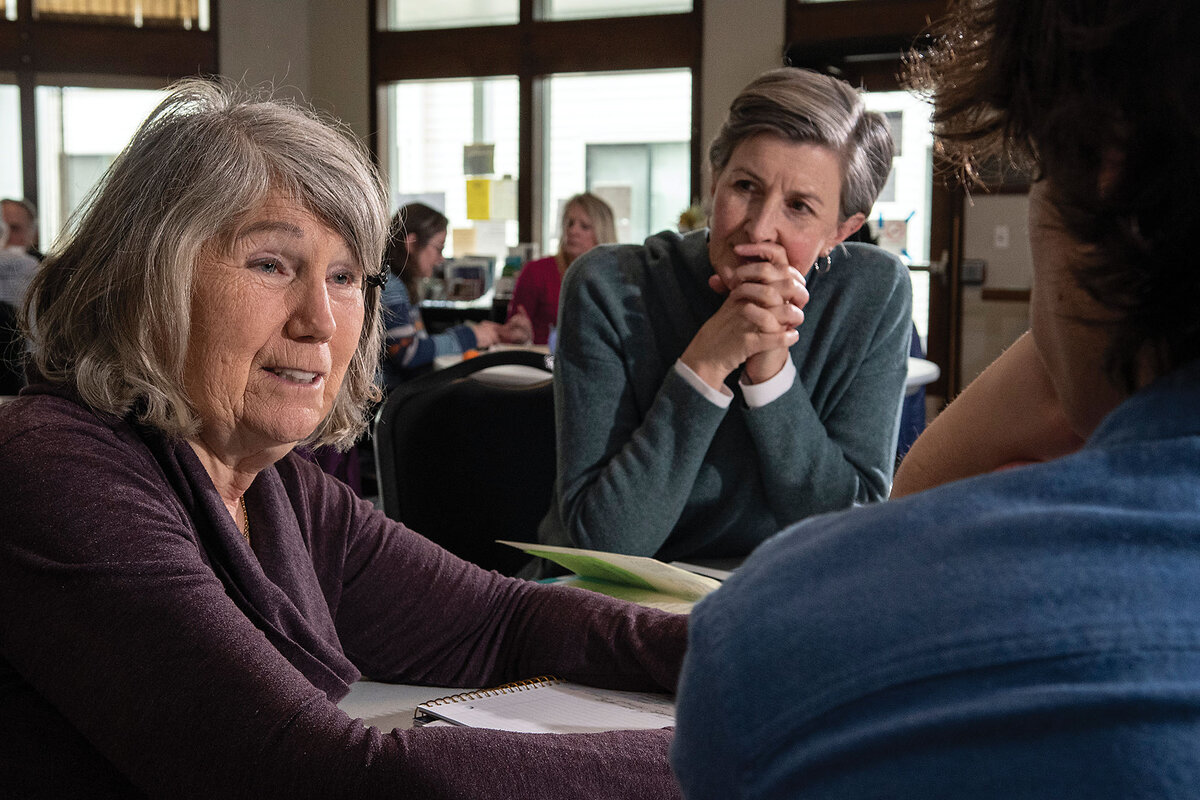
“They model what trust is. They show up,” says Frederick Riley, executive director of Weave: The Social Fabric Project, founded by columnist and author David Brooks with the Aspen Institute in Washington, D.C. The project seeks to mend the country’s shredded fabric of social trust, which it believes has left Americans “divided, lonely, and in social gridlock.”
“You don’t trust the government; you don’t trust big business; you don’t trust big NGOs,” says Mr. Riley, whose project helps support organizations like Ms. Wilson’s across the country. “But this neighborhood person is out here every day, helping to till the community garden for no pay. ... They’re teaching you how to trust again.”
Organizing an alliance to build trust
Barbara Seaman apologizes that her minivan smells like pork as she drives around the conjoined towns. Ms. Wilson, riding shotgun, plays tour guide to Monitor journalists along for the ride. A few days previously, the duo transported braised barbecue to ReFuel Washougal, a program that serves free meals to residents in need. The East County Citizens’ Alliance took a turn hosting a dinner in collaboration with Washougal High School’s culinary arts program.
“If you were in my car, it’d be full of traffic cones and trash bags and trash,” Ms. Wilson says. “This is what community-building looks like. It doesn’t look like fancy discussions about policy.”
But the group’s members did get their start with discussions. About 90 residents, including Ms. Wilson and Ms. Seaman, held regular meetings in 2021 about the culture war issues roiling their schools. The topic of political extremism in the area started cropping up more and more.
The discussions soon grew into the organized alliance. People decided they were done focusing on politics as a community. “I’m so sick and tired of everybody labeling everybody,” says Ms. Seaman, the group’s assistant executive director. “I just want to get people together to build relationships.”
As they drive, Ms. Seaman points out all the community gathering places that have closed in recent years. The bowling alley near downtown Washougal. The community pool in Camas. A once-popular family restaurant that served both. These were the places people would sit for hours and talk. These were the tendrils of community. Now they sit, abandoned and shuttered.
The emerging alliance needed a project that could both build community ties and be free of controversy. So it decided to start simply, getting people with opposing political views outside, working together for a common purpose in the offline world.
“Nobody likes trash,” says Ms. Wilson. “They’re both picking up trash next to each other. They’re talking about, ‘Who would leave a tire on here? ... And I’m sick of these beer cans out here. What are people doing?’”
That could lead to conversations about drinking and driving, she continues. “We’re all against drinking and driving. They’re finding what they’re against and for, together, in the moment. And if you have to start out small because everybody hates trash, that’s where you start.”
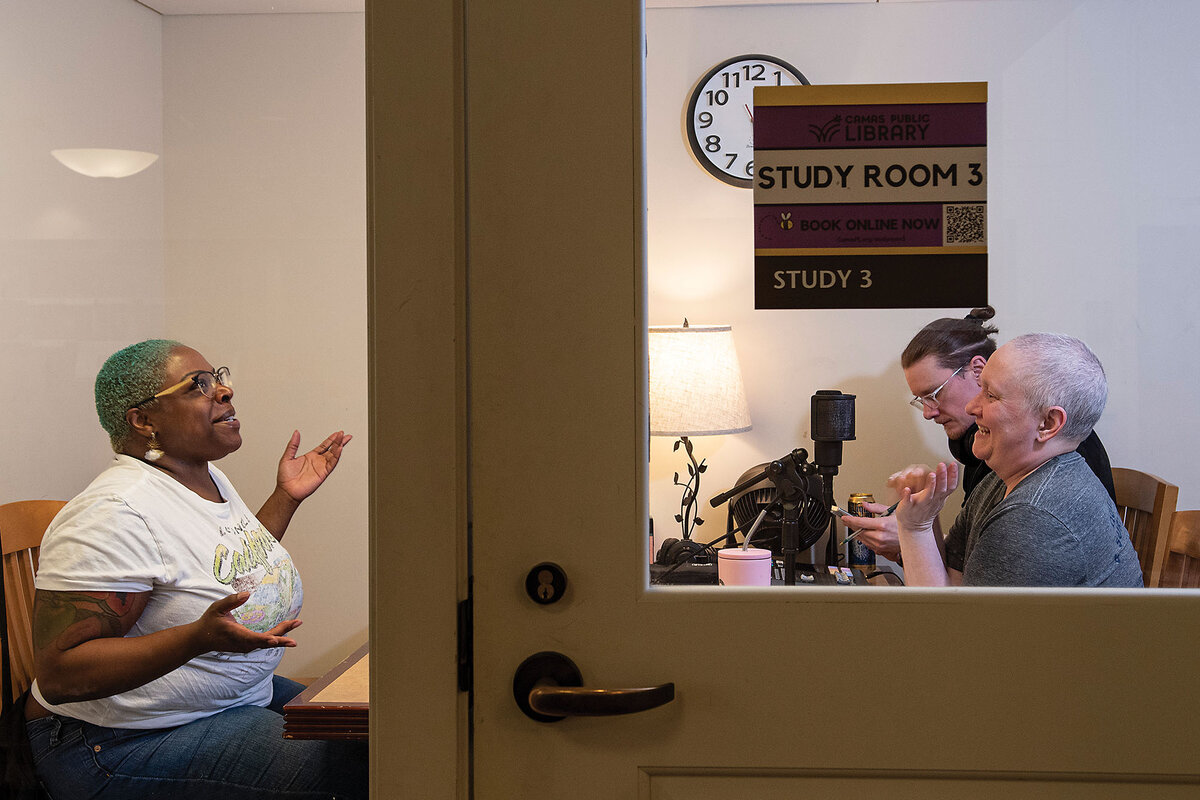
In addition to picking up the detritus along State Route 14, which runs parallel to the Columbia River, volunteers also decided to meet to plant wildflowers. They decided to tutor teenagers struggling with postpandemic learning loss. They decided to paint murals on buildings in downtown Washougal, which, too, is still recovering from the pandemic.
While laboring together to help the towns they love, the alliance’s volunteers are indeed starting to trust one another to show up. Ms. Wilson hopes that the trust now taking root within the politically diverse group of citizens can grow and flourish and spread beyond those participating in this civic project of building trust.
A “Trust Index”
Trust in institutions has taken a major battering in the United States, even before the pandemic. Today only one-third of Americans trust churches, Gallup finds. Just one-quarter trust the presidency. Big businesses are viewed with suspicion by 86% of Americans. A minuscule 8% trust Congress. Only small businesses and the military still enjoy the trust of a majority of Americans.
“But what gives me hope for this are these stories, and these people that I get to talk to every single day,” says Mr. Riley, who travels extensively for Weave.
He mentions how his project supports a Baltimore effort, led by two women, to build a stage in an alleyway previously littered with needles and dead rats.
“We helped them bring the Baltimore Symphony there for an evening production in this really rough neighborhood,” he says. “And now they’re figuring out how they can build these stages [in] alleyways in neighborhoods all across Baltimore.”
His organization has spent the past year creating a soon-to-be-released project called the Trust Index. It’s a neighborhood score of what trust looks like in American communities. Scores will be based on numerous factors. For instance, does the area have spaces where people can meet? Does the community exhibit trusting behaviors such as turning out to vote, participating in community meetings, or contributing to nonprofits?
“I’m optimistic, because I don’t believe that a government can help us out of this issue that we’re in,” says Mr. Riley. “But I do know these people in neighborhoods that I’ve traveled to all around our country who have the power to corral people to come together in their community.”
Cross-pollinating within a community
On a drizzly and gray Sunday afternoon, the sun is more elusive even than Washougal’s celebrity resident: Bigfoot. A team of 14 assembles, undeterred by the inclement weather, to tend to the wildflowers it planted near the highway earlier. Ms. Wilson and Ms. Seaman are delighted at the larger-than-expected turnout. Most of the volunteers are people that Ms. Wilson doesn’t know.
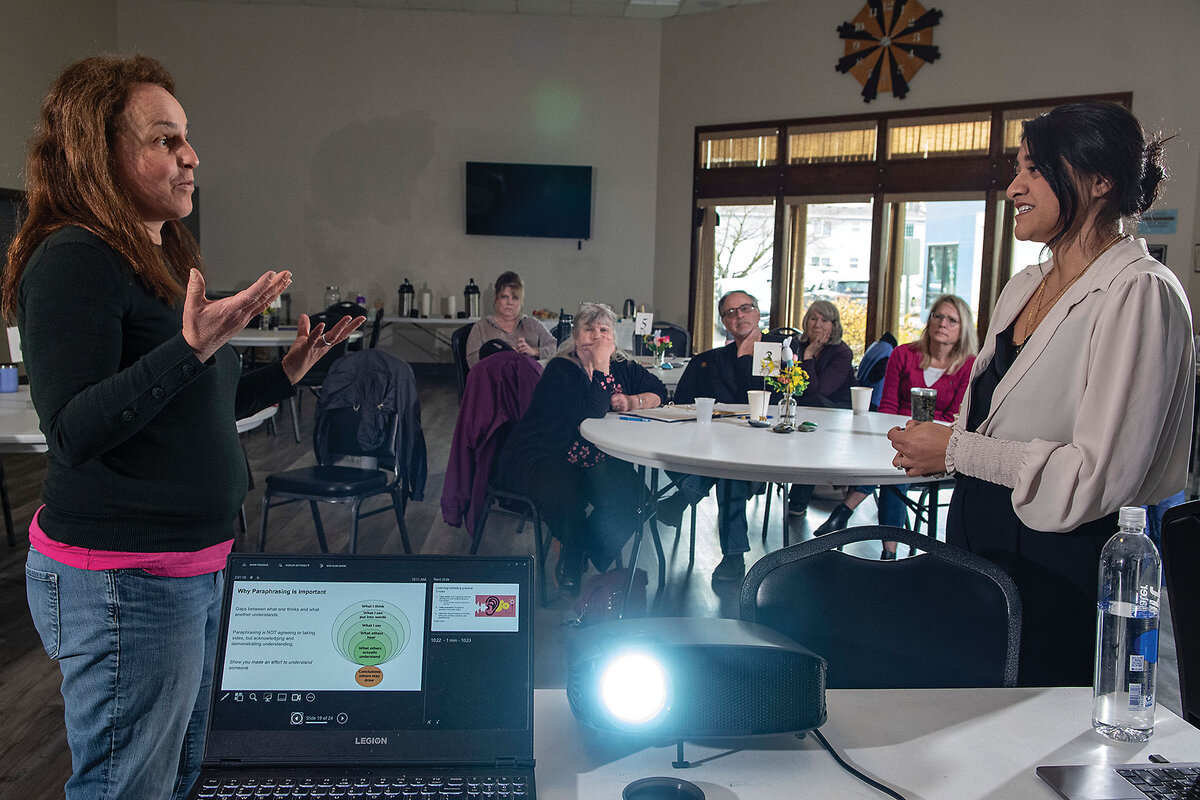
“What happens when you cross-pollinate like that in the community?” she says. “Can you build or create something that didn’t exist before?”
Wearing fluorescent yellow safety vests, the team branches out along the roadside as cars and trucks whoosh past. Some plant seeds. Others wield weed trimmers to repel an encroaching thorny thicket of Himalayan blackberries. Volunteer Lukas Johnson takes notes on a clipboard about the progress of flowering California poppies.
The millennial English teacher became aware of the alliance via its blog, East County Voices. He appreciated how its essays highlighted the good within the community at a time when everything felt bleak.
“There was so much negativity surrounding that whole COVID era,” says Mr. Johnson, whose family lineage in the area dates back to 1852. “There was a lot of division.”
When the alliance tilled the land next to the highway in July, a retiree named Mitch Patton showed up with a tractor. “He’s one of the upriver folks,” says Mr. Johnson, describing him as “kind of the right-wing persuasion.”
For his part, Mr. Patton describes his politics as “kind of in the middle.” Though he’s not registered to vote, he says his friends range from right-wing Republican “wack jobs” to left-wing Democrats. He recalls the invective during the pandemic against those who didn’t wear masks or get vaccinated. It made everyone distrust each other. Mr. Patton blames local county measures for exacerbating tensions. A friend was fined during the lockdown for walking alone with his dog on a trail, which felt outrageous.
“Granted, it was a mess. And there were people dying left and right,” Mr. Patton says. “But when you live out in rural areas like we are, I think they went a little too far.”
The larger tragedy, he says, was the mental impact on children when the Washougal schools closed for a little over a year. During lockdown, his granddaughter – once a happy-go-lucky kid – cried day after day. Now, the ninth grader frequently misses school. Once the head of her class, she’s now in the bottom four or five.
“My oldest granddaughter is still a mess today,” says Mr. Patton. “I don’t know if she’s ever going to come out of it.”
He’s more optimistic that the neighbor-versus-neighbor tensions were a temporary phenomenon. When Mr. Patton saw a post on social media about the alliance’s highway cleanup activities, he reached out to help. He’s already involved in several local environmental endeavors, including serving on the advisory board of a Superfund site at the nearby Bonneville Dam. The amiable retiree was unaware that the East County Citizens’ Alliance core mission is repairing a politically riven community. “It’s a great idea,” he says.

Mr. Johnson, the young teacher, says the retiree’s selfless donation of his tractor sped up the big job of tilling the soil for the wildflowers.
“It was an opportunity to not see somebody for their political persuasion – as we so often have in these last several years – and just to see, ‘What good can I do for the community?’” Mr. Johnson says.
Conversation tables
This summer, Camas will stage its annual parade. Spectators lining the sidewalks will cheer on marching bands, clowns on stilts, and people racing each other in bathtubs fitted with wheels.
It’s a stark contrast to a very different kind of parade on these streets four years ago. When a peaceful march mourning the death of Mr. Floyd passed a gun store in Washougal, it was stared down by armed men.
“The mere presence of an armed rooftop sniper – wearing ear and eye protection, clad in all black, and brandishing an assault-style weapon toward the peaceful marchers – constituted a true public threat,” a Washougal resident complained to the City Council. (Washington allows citizens to carry firearms openly.)
The gun store, which features large signs with Bible verses on the building, recently posted ominous warnings on its website about the imminent arrival of “World War III.” (The owner refused to talk to the Monitor.)
Members of the alliance are acutely aware that although the pandemic is over, fault lines remain throughout Clark County. So they asked a professional mediator, Ryan Nakade, to help launch a bold new endeavor: talking together about controversial topics.
Mr. Nakade is a trainer for Cure: PNW, a group that addresses political violence in the Pacific Northwest and promotes conflict resolution. On a recent Saturday morning, 12 of the citizen alliance’s volunteers attended a training workshop to learn how to set up conversation tables in the community.
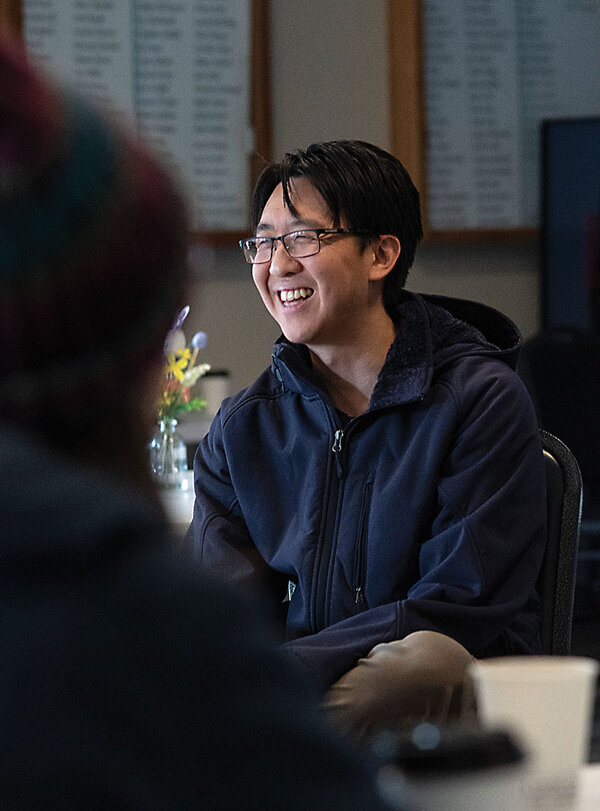
“We recognize that people feel like they don’t have a voice, like nobody cares about what they think,” says Ms. Seaman, who is a librarian at Washougal High School. “And that was causing so much unrest.”
A conversation table, set up in a public space, invites members of the community to sit down with someone and share what’s weighing on their hearts. The point of a conversation table, or “empathy booth,” isn’t to extract information so much as to build relationships. The alliance avoids publicly calling them empathy booths, however, because it worries that “empathy” sounds like a left-leaning term, and it doesn’t want to scare off conservatives.
During the workshop, Mr. Nakade demonstrates how to ask questions that aren’t loaded, judgmental, or ideologically biased. Instead, questions should inspire deeper reflection. In typical conversations about politics, people often begin simply by parroting familiar talking points from their political tribe.
“In mediation, there’s a difference between what’s called ‘the interest’ and ‘the position,’” Mr. Nakade tells the Monitor. “The position is the surface thing that someone says they want. The interest or value is what they really want. But sometimes you have to dig in order to unearth that value, that core value.
“Once you unearth it, for me, it feels like striking conversational gold,” he says. “There’s almost a cathartic release in the conversation where I feel like, ‘Oh, this is what the issue is really about.’”
People have different interpretations of values such as justice, liberty, equality, equity, and parental rights. A conversation-table facilitator can ask questions such as, “How did that idea become important to you? What are the personal life experiences that shaped how you think about this?”
Ms. Wilson envisions the East County Citizens’ Alliance setting up conversation tables in public settings such as a farmers market, a coffee shop, or a library. She floats the idea of possibly even setting up a conversation table outside the gun store.
The alliance isn’t interested in changing people’s minds. The point is authentic conversations with others.
“Once you unleash or unlock the value, you can then come up with solutions that fulfill that value, or satiate that value, that are outside of the box,” Mr. Nakade says.
“We can be actors in our own public life.”
The first time Ms. Wilson stood on the cliff overlooking the Columbia River Gorge, she wished her son could see the view.
“I’m not very religious, but I texted him saying something like, ‘The fingerprints of God are still visible in this part of the country,’” she recalls. “The great geological forces, the eons of time. It’s all here.”

She’s lived in the Northeast, the South, and the Midwest. But here, in the Pacific Northwest, she felt like she’d found her forever home. Now that the onetime single mother is nearing retirement, her focus has shifted from caring for her immediate family to having a broader awareness of the wider world.
“I started thinking about, ‘What is home? How do I make this my home?’” she says. “It’s where you invest your time, talent, treasure. It’s where you’re plowing yourself into the ground.”
It’s been a little over two years since the social worker helped found the East County Citizens’ Alliance. The organization is still not too well known in the conjoined towns. But seemingly everyone knows about the yellow-jacketed volunteers who are beautifying Route 14. During Sunday’s work with wildflowers, passing vehicles honked encouragement. The alliance hopes to expand even as some members of the community continue to feel pessimistic about the possibility of a more harmonious community. An influential local conservative, Rob Anderson, says what’s needed is a reckoning with pandemic policies such as vaccine mandates, which he says were an authoritarian overreach into personal liberty.
“There has to be clarity; there has to be a recognition of mistakes made in order to really find true healing,” says Mr. Anderson, who’s been gathering signatures for a Restore Election Confidence Initiative. “You can’t have healing without repentance.”
He’s not the only member of the community who feels cynical about the community becoming even relatively harmonious. Outside the local hardware store in downtown Washougal, one person says he’s moving to Idaho because he was so tired of local politics.
Members of the alliance’s leadership committee don’t assume they’re right about everything. The initiatives they’re piloting are instinctual. They realize their mission is ambitious.
“We don’t know if it will work,” Ms. Wilson says. “But I don’t think anything else will work. ... It’s not just about the wildflowers. We’re showing people they don’t have to be resigned about things. We can be actors in our own public life.”
Editor’s note: This story has been updated to correct the timing of local business closures. Both the swimming pool and bowling alley closed shortly before the pandemic. Additionally, the explanation of ReFuel Washougal’s services has been clarified. The program provides meals to residents in need from many walks of life.

Today’s news briefs
• Abortion drug bill: Louisiana lawmakers approve a first-of-its-kind bill that would classify two abortion-inducing drugs as controlled and dangerous substances.
• Macron lands in New Caledonia: French President Emmanuel Macron lands in the Pacific island for a day of talks on deadly riots triggered by a contested electoral reform.
• New York moves on migrants: The city steps up efforts to push them out of its overwhelmed shelters by enforcing a new rule limiting some adult asylum-seekers to a month in the system.
• Ecuador violence: President Daniel Noboa declares a new state of emergency in seven of the country’s 24 provinces and one area of another province, citing a rise in violent deaths and other crimes.
• WNBA heads north: Toronto awarded the women’s pro basketball league its first franchise outside the United States. The expansion team is set to begin play in 2026.

Attack on Slovakia’s prime minister points to a broader challenge for Europe
When political vitriol stirs violence, how does society get the temperature back down? That’s a question Europe is struggling with right now amid a wave of attacks on politicians, including the prime minister of Slovakia.
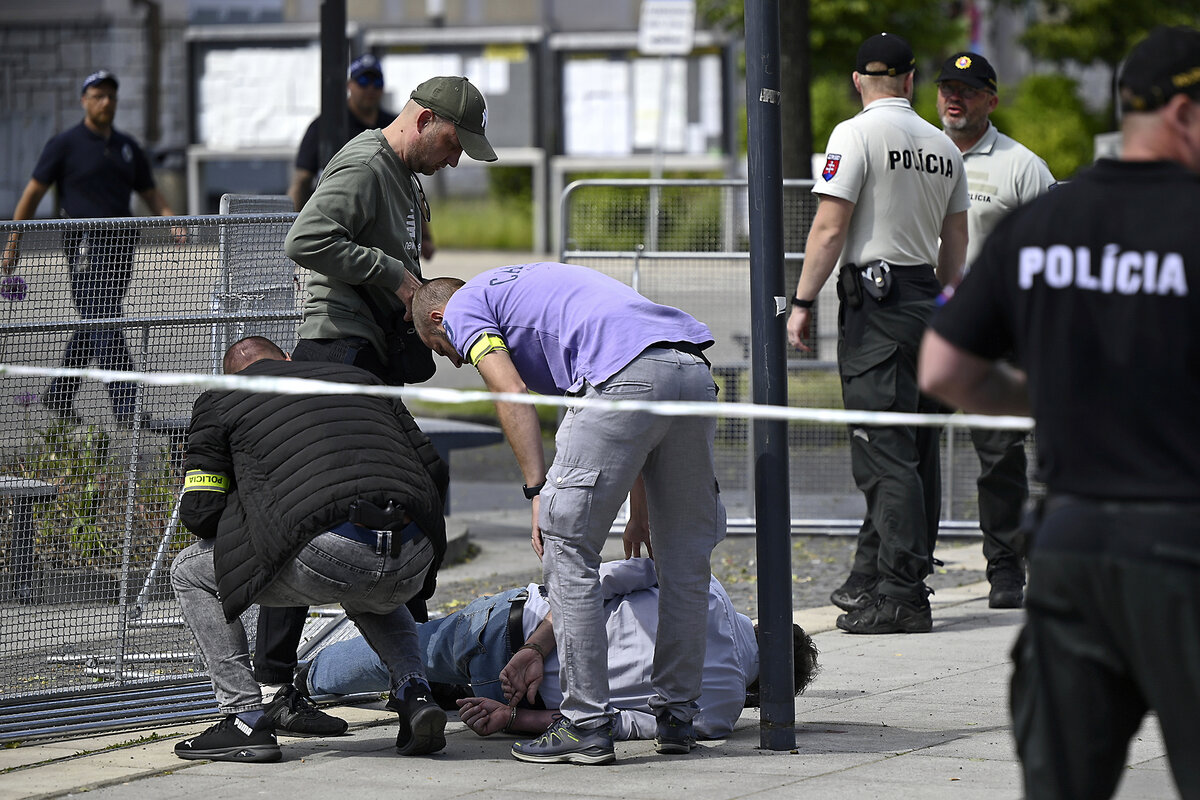
- Quick Read
- Deep Read ( 6 Min. )
The attempted assassination of Slovakian Prime Minister Robert Fico last week was only the latest act of politically motivated violence currently racking Europe.
The incidence of attacks has been ticking upward year over year across the Continent. Experts say that it is instigated by language used on social media, which ultimately presents a threat to democracy. The apparent lack of limits on what can now be said about a political opponent has made it easier for physical acts to emerge.
In Germany in 2023, a parliamentary inquiry reported nearly 3,000 attacks on members of political parties, including 1,219 attacks reported against the Greens, 478 against the far-right Alternative for Germany, 420 against the Social Democrats, and 299 against the Free Democrats. The tally this year is on track to top those figures easily.
“Political debates have become very personal, aggressive, full of hatred, and it’s done with impunity,” says Soňa Muzikárová, a Slovakian political economist. “And then as people watch this and it becomes normalized, it also is mirrored in society. Logically, it’s a matter of time when and how this is going to bubble up in the physical space as well.”
Attack on Slovakia’s prime minister points to a broader challenge for Europe
Tim Wagner, a sitting member of German parliament, was hanging campaign posters for a liberal colleague when he was accosted on the streets of Eisenberg.
“It was a sunny Sunday, a quarter past 12. A man came up to me and said, ‘You can’t hang these posters here.’ I said, ‘Yes I can.’ He said, ‘We can fight over it,’” says Mr. Wagner, a Free Democrat.
The man – a sympathizer of the right-wing Alternative for Germany party – blocked Mr. Wagner’s path as he tried to leave. Mr. Wagner managed to get into his car, but the man and two others surrounded the vehicle and began kicking the car door.
“We are under attack from both sides, from the right and the left,” says Mr. Wagner, who’s been stalked and had strangers show up at his door. “But this time my 14-year-old daughter was sitting inside the car. She was shocked.”
It was only the latest act of politically motivated violence, the incidence of which has been ticking upward year over year not only in Germany but across Europe. Public attention has been drawn to the issue by the attempted killing of Slovakian Prime Minister Robert Fico last week, the highest-level assassination attempt in decades.
But attacks on politicians had been on the upswing even earlier, instigated by polarizing language used on social media, which ultimately presents a threat to democracy, say experts. The apparent lack of limits on what can now be said about a political opponent has made it easier for physical acts to emerge. The upsurge in violence, they say, may usher in new period of reflection across Europe as a whole, especially as it heads into Continent-wide parliamentary elections next month.
“Political debates have become very personal, aggressive, full of hatred, and it’s done with impunity,” says Soňa Muzikárová, a Slovakian political economist at the Florence-based European University Institute. “And then as people watch this and it becomes normalized, it also is mirrored in society. Logically, it’s a matter of time when and how this is going to bubble up in the physical space as well. It’s kind of a perpetual feedback loop.”
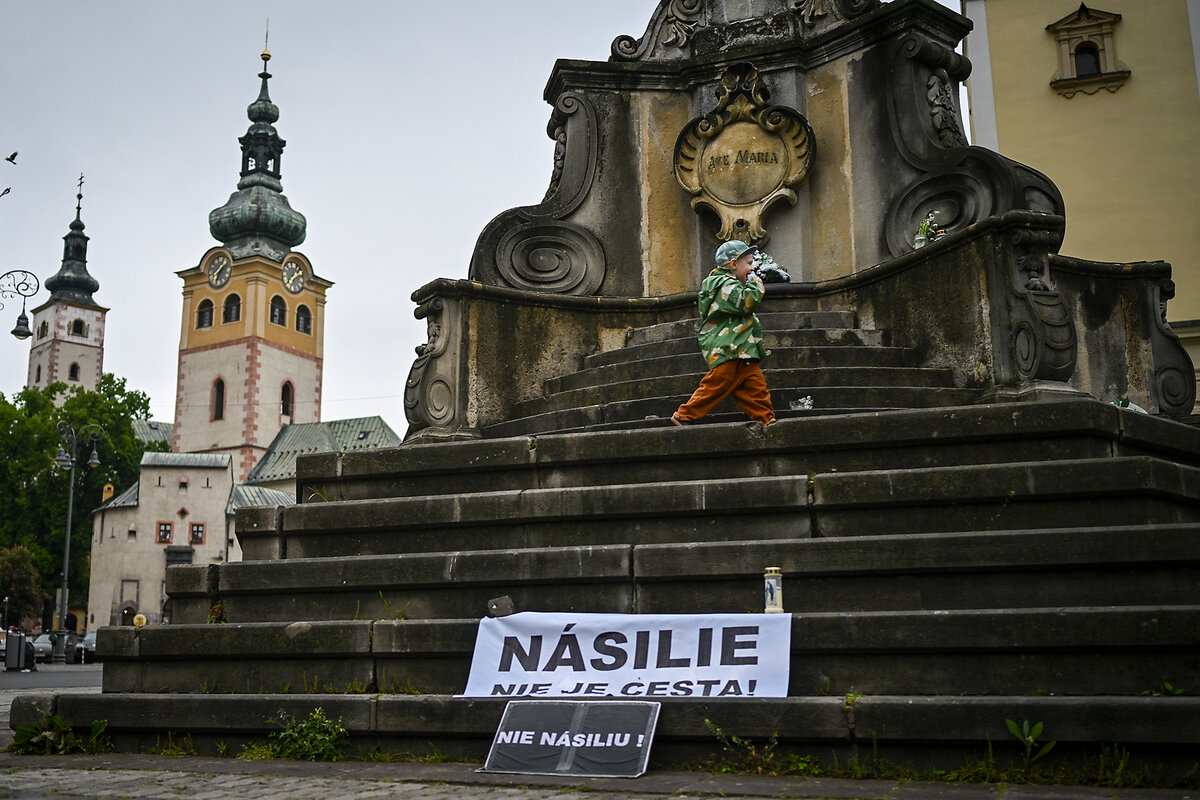
A heated situation
There have been numerous incidents of politically motivated attacks in Germany just over the last few months. Social Democrat Matthias Ecke was beaten by a group of teenagers as he was hanging posters in Dresden, and needed hospitalization. “As you will surely understand he is not yet able to resume his activities in full capacity,” wrote one of Mr. Ecke’s spokespersons, declining an interview request.
Berlin state Sen. Franziska Giffey endured head and neck injuries when she was assaulted at a routine library visit earlier in May. Last year, the son of a Bavarian mayor found a pig’s head on the family’s doorstep. The list goes on. In Germany in 2023, a parliamentary inquiry reported nearly 3,000 attacks on members of parliament and political parties, including 1,219 attacks reported against the Greens, 478 against the far-right Alternative for Germany, 420 against the Social Democrats, and 299 against the Free Democrats. The tally this year is on track to top those figures easily.
Mr. Wagner blames a vitriolic environment that’s been worsened by hate spread online. “Nobody had an iPhone before 2006,” he says. “If I went out to a marketplace in Germany or Thuringia and spoke to people in person, the situation wouldn’t be as heated as it is on social media.”
Similarly, when Prime Minister Fico was shot, Slovakian Interior Minister Matúš Šutaj-Eštok pointed fingers at journalists, fellow politicians, and members of the public. “We are standing here slowly on the brink of civil war because hateful comments are on social media,” he said in a press conference. “Please let’s stop this immediately.”
Other politicians also say they want to calm down the rhetoric. Following the attack on Mr. Fico, several Slovakian parties called for a suspension of campaigning, despite European parliamentary elections looming in early June. And in Germany, leaders of the most-attacked parties – the right and the left – have called for calm.
“You would hope [the assassination attempt] gives rise to a little introspection around how political debates are conducted where there are threats of violence and very partisan or very deep-rooted splits on various ideological issues,” says Jacob Kirkegaard, a political economist and fellow at the German Marshall Fund of the United States.
But he feels the ultimate result is likely to be a beefing up of security measures. “There have been political assassinations or attempted assassinations in other European countries before, some of them successful, some of them not. And I think you’d be hard-pressed to say that they made a difference [in the level of rhetoric],” says Dr. Kirkegaard.
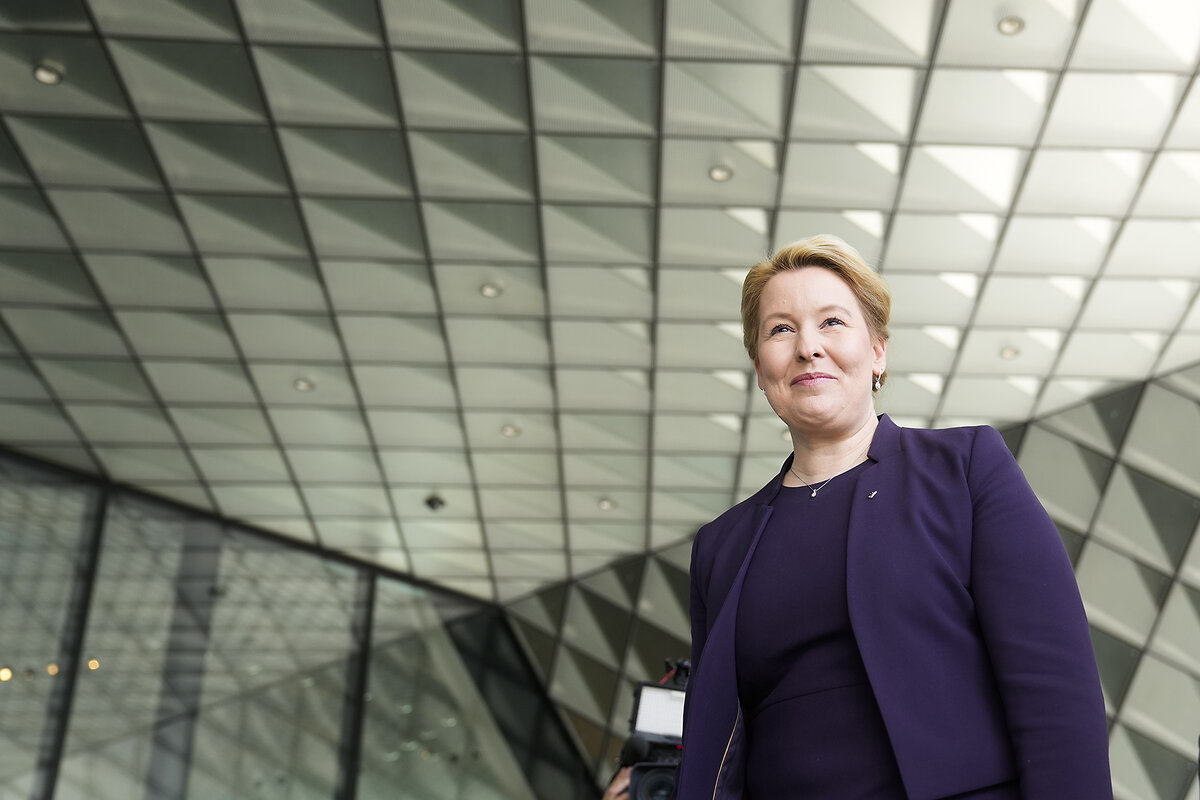
In Slovakia, Dr. Muzikárová expects the vitriol will continue. “The signals that I’ve seen so far are not positive to me,” she says. “Instead of a wake-up call, this will be a development which will be weaponized to further the current administration’s agenda. [Mr. Fico’s party] has been so quick after the attack to blame the journalist community, the opposition.”
Milan Nič, a Slovakian political scientist affiliated with the German Council on Foreign Relations, says there have been hints of unity, “but these signs and gestures are at the time more from individuals [rather than from the parties]. We are not out of the woods.”
“We have to calm down”
Threats are nothing new to Mr. Wagner, the politician whose car was surrounded as he hung posters last month.
A few years ago, three members of far-left, anti-fascist militant groups appeared on his home’s front lawn. The next year, Mr. Wagner moved his family to another home, only to have his address doxxed again.
Mr. Wagner is a former martial arts expert and judo teacher, he says, and feels he can take care of his personal safety. But his family didn’t choose public life, and his children are getting older and more aware, just as the threat to politicians has escalated.
“There have been so many conflicts: corona[virus], the war in Ukraine, immigration,” he says. “There’s conflict here in our land that is now coming out.”
Mr. Wagner and his fellow Free Democratic party members have instituted safety rules. They only hang posters during daylight hours. If they engage with the public, they must go with three other colleagues and never alone. “We also said to all members that they must immediately call the police if someone says harsh words,” says Mr. Wagner.
Ultimately, over the long term, Mr. Wagner has hope because the younger generation – including his children – is growing up with social media. They should be better able to discern what’s true from what’s fake than older generations are. “My hope is that the new kids learn how to discuss civilly and politely, and learn to see what’s fake news from Russia or from bots, and what’s really a real person’s writing,” he says.
He also sees some signs of hope, with politicians from all parties now calling for a tamping down of the political rhetoric, which he recalls first escalating over the last decade as the far right called for “Chancellor Angela Merkel to be put in prison.”
“It takes time,” Mr. Wagner says, noting it’s a challenging time to calm the rhetoric because of upcoming EU parliamentary and local elections. “But we know we have to calm down. We must start with social media and bring the discussion to a higher level.”

On Ukraine’s battlefields, this group respects fallen soldiers – no matter which side
When soldiers are lost on the battlefield, whether fatally or through capture, it leaves unanswered questions back home. Some go to great lengths to answer those questions, and bring closure and relief.

- Quick Read
- Deep Read ( 5 Min. )
While Ukrainian and Russian forces tear up the bucolic landscape, people like Oleksii Yukov and his team collect the remains of those killed in combat. Deceased Russians are eventually returned to their nation, while Ukrainians go back to their families for mourning.
It’s fraught, difficult work, but vital for families on both sides seeking closure and a chance to grieve. People missing due to armed conflict tend to afflict societies long after the guns go quiet. Hundreds of thousands of people are still considered missing from the Iran-Iraq war in the 1980s.
Handling bodies correctly and in a timely manner allows Ukrainian families to find closure and Russians to have a proper starting point for their DNA analyses. And the limited cooperation between Russia and Ukraine shows that the two sides can still find a measure of middle ground, at least on humanitarian issues.
“We all are human beings,” says Mr. Yukov. “We do not differentiate between Russians and Ukrainians in the way we treat them. If Russians saw how we treat their dead soldiers, this war would probably end tomorrow.”
On Ukraine’s battlefields, this group respects fallen soldiers – no matter which side

Oleksii Yukov ventures into Ukraine’s battle zones in a camouflaged vehicle with a singular mission: to make sure respect is shown to the fallen, regardless of whether they were Russian or Ukrainian.
While the warring forces tear up the bucolic landscape, he and his team, Platsdarm, collect the remains of those killed in combat. Deceased Russians are eventually returned to their nation, while Ukrainians go back to their families for mourning.
“We all are human beings,” says Mr. Yukov. “We do not differentiate between Russians and Ukrainians in the way we treat them. If Russians saw how we treat their dead soldiers, this war would probably end tomorrow.”
It’s fraught, difficult work, but vital for families on both sides seeking closure and a chance to grieve. And along with exchanges of prisoners of war and noncombatants who had been detained amid the conflict, the limited cooperation between Russia and Ukraine shows that the two sides can still find a measure of middle ground, at least on humanitarian issues.
A life’s mission
People missing due to armed conflict tend to afflict societies long after the guns go quiet. Hundreds of thousands of people are still considered missing from the Iran-Iraq war in the 1980s. That makes the work of Platsdarm so critical. Handling bodies correctly and in a timely manner allows Ukrainian families to find closure and Russians to have a proper starting point for their DNA analyses.
“The work they do ... contribute[s] to preventing soldiers who are missing in action from staying MIA,” says Achille Després, the Kyiv spokesperson for the International Committee of the Red Cross. The international organization supports local efforts in forensic analysis with training and material, and helps operationalize agreement on repatriation between the warring sides.
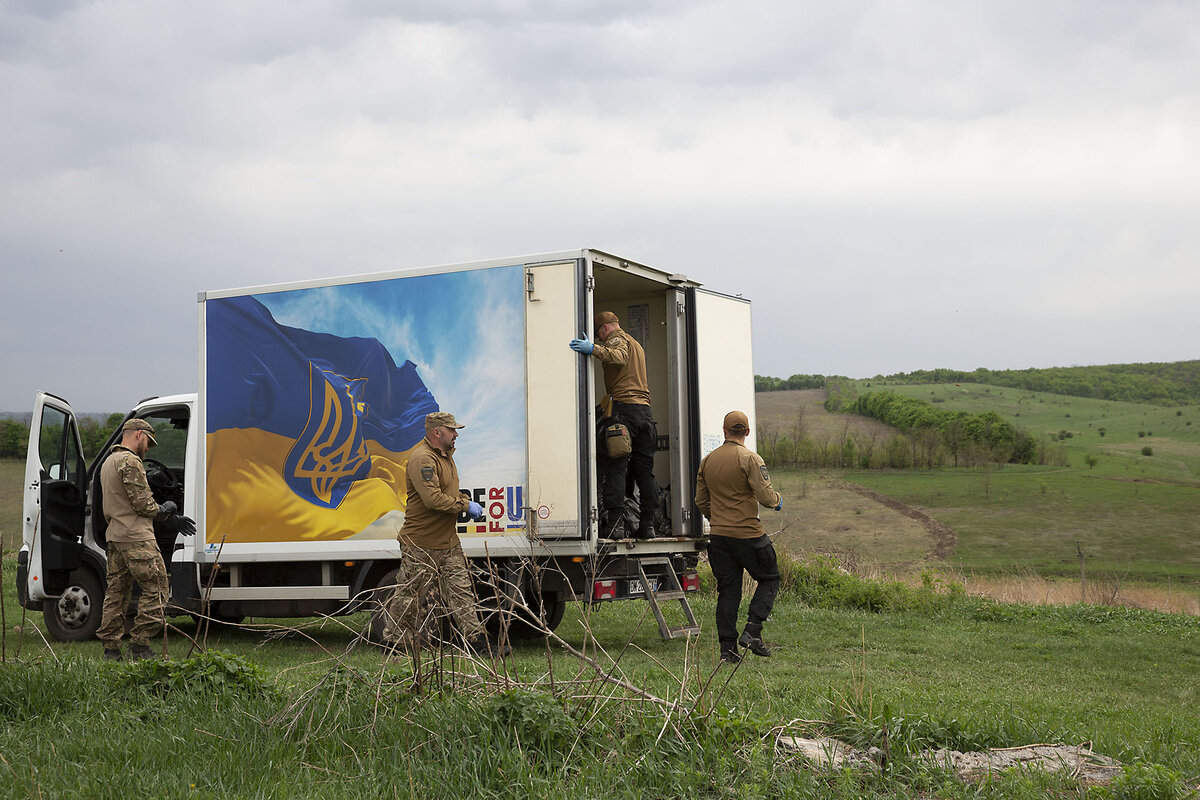
Mr. Yukov’s passion for skeletal sleuthing started at the age of 13, while trying to decode the hows and whys of war. One spring after much pestering, his brother took him to the forests near Sviatohirsk, to see the remains of Soviet soldiers who were killed during World War II – flashes of bone in a sea of green.
“What humans are we if we allow ourselves to live among unburied souls?” he asked himself. “I decided to make it my life mission to give peace to every dead soul. All I pray for is to have enough time to accomplish this.”
As an adult, he joined a volunteer group that was focused on returning the bodies of soldiers from World War I and World War II. That changed in 2014, when Russia annexed Crimea and occupied territories in the resource-rich regions of Donetsk and Luhansk, and it intensified in 2022 when Russia launched all-out war.
Now Platsdarm, Mr. Yukov’s volunteer team, frequents military sites to collect information that could help identify soldiers’ remains. “By knowing the number of the tank, the location where it was destroyed, families will be able to identify who was inside it,” he says.
Such painstaking puzzle work paves the way for the repatriation of Russian soldiers to their homeland. And Ukraine has received its own troops’ remains from Russia – though not as a quid pro quo, authorities are quick to stress.
“The repatriation process is not an exchange or a swap,” says Petro Yatsenko, a representative at the Ukrainian government’s Coordination Headquarters for the Treatment of Prisoners of War. “We are willing to pass these bodies to the other side. And the other side is willing to pass the bodies back to Ukraine. This process occurs regularly, but not as regularly as we would want.”
To date, there have been 65 repatriation rounds from Russia to Ukraine, returning the remains of 2,708 Ukrainians killed since Feb. 24, 2022. A “comparable” number of bodies have been repatriated to Russia.
The complicated math of POW exchanges
But dead soldiers are not the only concern. Recovering POWs and captive noncombatants is also a top priority in Kyiv, leading to quiet discussions with Moscow.
The two countries have conducted 51 exchanges of POWs, leading to the return of 3,135 people to Ukraine, including 147 civilians, according to Ukraine’s official figures. The largest prisoner swap to date delivered 230 people back to Ukraine in January.
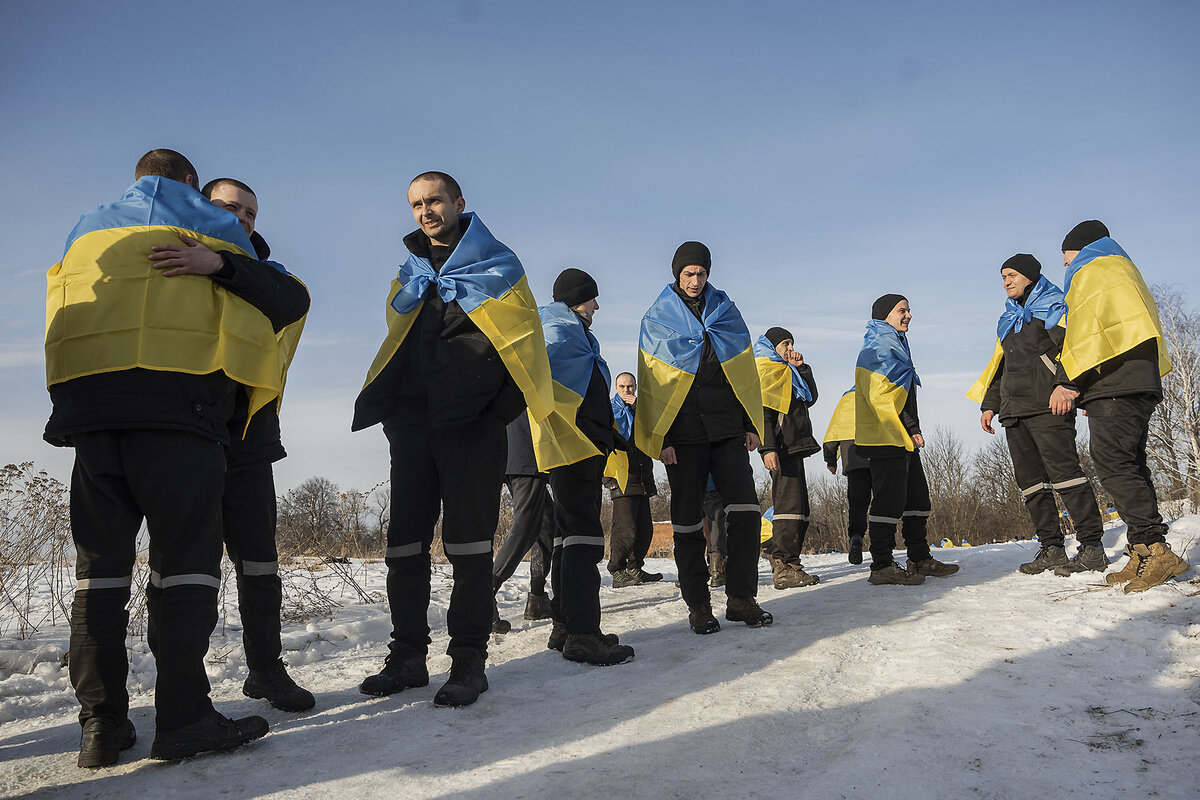
“Every POW exchange is unique,” says Mr. Yatsenko. “It is not math. There is no general formula for such prisoner swaps. For example, we exchanged for one Russian politician more than 150 prisoners of war. ... The main principle is this: We ask for women [and] heavily injured people first, and we try to do that every time.”
There are several complicating factors when it comes to POW exchanges with Russia. One, Mr. Yatsenko says, is that Russia tries to exchange Ukrainian civilians for Russian POWs. Kyiv must tread carefully in such cases to avoid creating an incentive for Russians to capture more civilians in the territories they occupy. There are about 6,000 Ukrainian POWs in Russian captivity, and about 1,600 of them are noncombatants, according to the same source.
Russia is particularly reluctant to let go of Ukrainian fighters in the Azov brigade, which has past links to far-right groups, and others who fought fiercely to defend the industrial hub of Mariupol. Billboards and graffiti calling for their release can be spotted across Ukraine. “Of course, Russia says they are fascists and very bad people, so they say it is very difficult to let these people free,” says Mr. Yatsenko.
Talks over the repatriation of remains and POWs occur on separate tracks. When it comes to negotiating the release of POWs, Ukraine has had three interlocutors throughout the course of the conflict. These are the Russian armed forces, Chechens who fight for Russia, and the notorious mercenary group Wagner, which was disbanded last year after its leader directly challenged Kremlin authority.
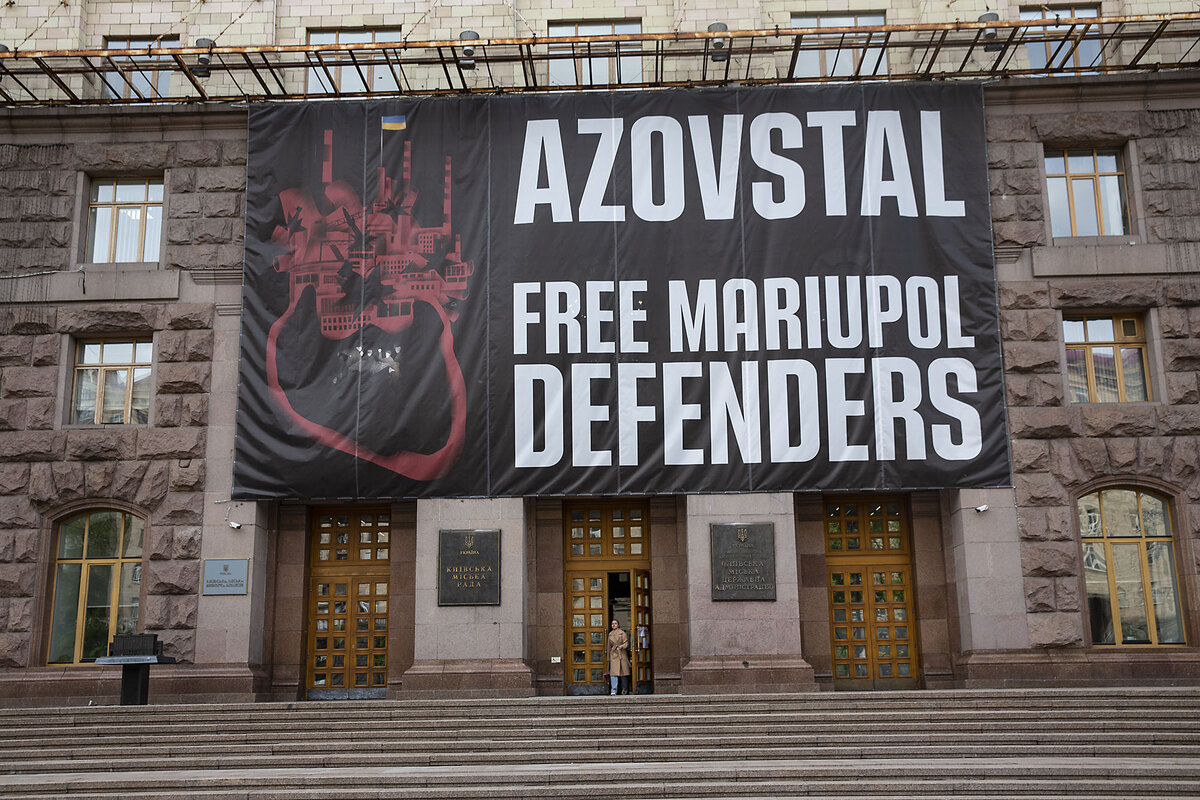
“We still have cases of people not requested by the Russian side,” among them high-ranking officers and pilots, adds Mr. Yatsenko. “We don’t know why. If we have a Chechen battalion fighter as a result of our activities, it is like jackpot. Chechens are very interested to take their people back to Chechnya. They don’t want them to be taken into captivity.”
A step toward peace?
Whatever progress Ukraine and Russia make on exchanges of POWs or soldiers’ remains, though, such dialogue is easier than finding a political settlement to conflict, says Mr. Després, the International Committee of the Red Cross spokesperson.
A summit is planned in Switzerland in June to brainstorm a way out of the conflict – but without Moscow. “Should Russia want to have peace, they can just move their troops back to their territory,” says Mr. Yatsenko.
Still, Mr. Després says, the capacity to cooperate on the humanitarian issues helps build trust between the enemy sides. The fact that conversations are taking on several issues and are among multiple actors across the divide is a rare positive sign amid the many negatives of war.
“Having a dialogue is better than having no dialogue,” points out Mr. Després. “When two enemy sides speak on humanitarian issues, it can be a step to building trust and towards eventual peace.”
Reporting for this story was supported by Oleksandr Naselenko.

A House committee investigates COVID. Surprisingly, it’s making headway.
A House committee’s substantive hearings this month stand in stark contrast to the grandstanding and partisan fights elsewhere in Congress – and have shed new light around a highly politicized issue.

- Quick Read
- Deep Read ( 6 Min. )
When House Republicans formed a special committee to investigate the pandemic, the odds of bipartisan cooperation seemed low. COVID-19 origins, the first of nine topics it was charged with investigating, was highly politicized. But the committee’s hearings this month have been surprisingly bipartisan, marking a significant shift in the politics around the pandemic.
GOP investigations into U.S. taxpayer-funded research on coronaviruses in Wuhan, China, the epicenter of the pandemic, were once dubbed a “witch hunt” by Democrats. The larger question of COVID-19 origins is still far from settled. But members from both parties are now moving to hold accountable federal officials and grantees – including a senior adviser to Dr. Anthony Fauci, for an apparent breach in trust. And the Biden administration has acted on the committee’s recommendation to suspend funding to a key figure at the heart of the COVID-19 origins debate.
“It’s so important to restore confidence in public health and science by showing that where we identify misconduct, we take it seriously,” says Miles Lichtman, the Democratic staff director of the select subcommittee. “That is not a political issue; that is about best serving the American people.”
A House committee investigates COVID. Surprisingly, it’s making headway.

When House Republicans formed a special committee to investigate the COVID-19 pandemic in January 2023, the odds of bipartisan cooperation seemed low.
Some of the members on the committee were considered bomb-throwers, more interested in generating viral clips than in passing legislation. And COVID-19 origins, the first of nine topics it was charged with investigating, was one of the most politicized issues in Washington.
With more than a year’s work under its belt, the committee has turned out to be surprisingly bipartisan – and effective. This week, it prompted the Biden administration to suspend funding to a scientist at the heart of the COVID-19 origins debate, Peter Daszak, and his organization. It also proposed debarring him and his nonprofit from receiving federal funds going forward. And on Wednesday, Democrats joined Republicans in grilling another scientist, a longtime adviser to Dr. Anthony Fauci, about apparent efforts to shield his emails from Freedom of Information Act (FOIA) requests.
“It is not antiscience to hold you accountable for defying the public’s trust and misusing official resources,” said the top Democrat on the committee, Dr. Raul Ruiz of California.
The substantive hearings and bipartisan action from the House Select Subcommittee on the Coronavirus Pandemic mark a significant shift in the politics around the issue. GOP investigations into U.S. taxpayer-funded research on coronaviruses in Wuhan, China, the epicenter of the pandemic, were once dubbed a “witch hunt” by Democrats. The larger question of COVID-19 origins is still far from settled. But members of both parties are now moving to hold federal officials and grantees accountable for an apparent breach in trust.
“It’s so important to restore confidence in public health and science by showing that where we identify misconduct, we take it seriously,” says Miles Lichtman, the Democratic staff director of the select subcommittee. “That is not a political issue; that is about best serving the American people.”
“A breakthrough moment”
The committee has been particularly united in its dealings of late with Dr. Daszak, president of EcoHealth Alliance, a New York-based nonprofit that researches emerging diseases with the goal of preventing future pandemics.
Leading up to the pandemic, Dr. Daszak had been working with the Wuhan Institute of Virology on the potential for bat coronaviruses to jump to humans, funded by a grant from the National Institute of Allergy and Infectious Diseases.
Dr. Daszak and his allies have strenuously rejected speculation that their research may have had a role in sparking the pandemic. Many Democrats in the last Congress also dismissed such speculation as a conspiracy theory motivated by animus toward Dr. Fauci and his role in shaping national COVID-19 policies. That made it politically difficult to investigate transparency and compliance concerns surrounding Dr. Daszak and his organization.
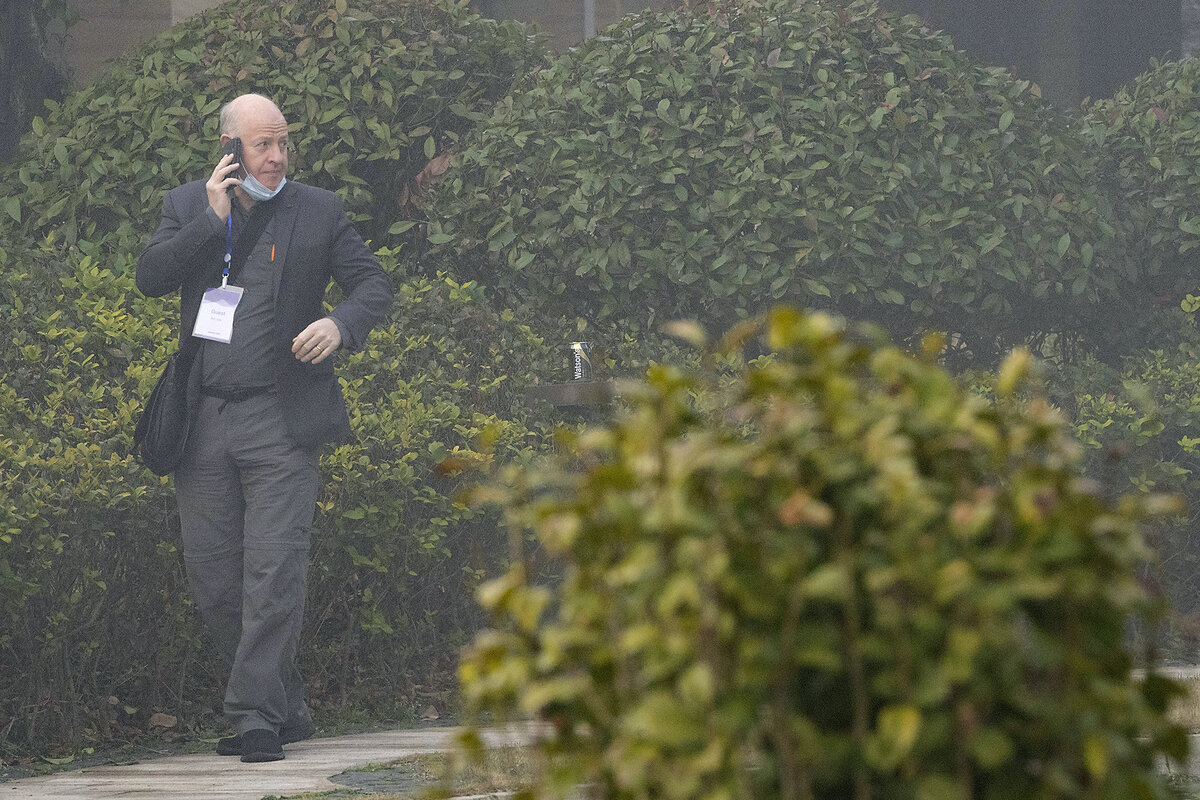
However, a senior Democratic aide to the committee credits Dr. Ruiz with directing their team to keep an open mind and scrutinize the available facts. Likewise, Chair Brad Wenstrup, an Ohio doctor and Republican, says he’s sought to base the investigation on hard evidence, “not just innuendo.”
“We’re actually finding out what people said and did so that we can make a better plan going forward,” says Dr. Wenstrup in a phone interview.
Starting last fall, Democrats and Republicans sat together through more than 100 hours of transcribed interviews, including a lengthy one with Dr. Daszak, and reviewed reams of documents. That work led to a bipartisan grilling of him at a May 1 hearing.
“That was a breakthrough moment,” says a senior GOP aide.
Following the committee’s recommendation, the Department of Health and Human Services (HHS) has suspended funding for both Dr. Daszak and EcoHealth Alliance and proposed they be debarred from receiving federal funds. Since 2008, the organization has received $90 million in federal funding, about 20% of which came through HHS, according to Nature.
In a May 21 letter, HHS faulted Dr. Daszak for his organization failing to notify the National Institutes of Health that the coronaviruses that the Wuhan Institute of Virology was studying had “appeared to grow beyond permissible thresholds.”
The National Institutes of Health had flagged that lapse in October 2021, after EcoHealth Alliance filed a progress report on its work nearly two years late; HHS did not explain why it is only now taking action against Dr. Daszak. However, it said that the cause was “of so serious or compelling a nature that it affects his present responsibility.”
Dr. Daszak strongly refutes that, noting the many steps he and his organization have taken to ensure compliance over the past few years. He says he will be “rigorously” contesting the proposed debarments and “presenting substantial evidence to demonstrate that they are inappropriate.”
“This has been a series of committee meetings and public hearings where a case to prosecute has been put forward without allowing the defendant to properly respond,” says Dr. Daszak in a phone interview. He notes that the GOP majority called for his debarment before hearing his testimony.
Some see the singular focus on him and his organization as scapegoating, possibly in an attempt to insulate others – including U.S. officials – from further scrutiny.
Meanwhile, Dr. Daszak says, the setback to his organization will have an “awful” impact on future pandemic prevention. Less than a week after his hearing, he says, an agency rescinded an offer for a five-year project EcoHealth Alliance had been planning on the risks of wildlife farming.
“At some point,” he adds, people will “realize what’s been lost, and realize how unfairly we’ve been treated.”
A few bad apples or a systemic problem?
The committee’s investigation continued Wednesday with a similarly bipartisan grilling of Dr. David Morens, the Fauci adviser, who was earlier placed on administrative leave amid concerns about federal records violations.
In one of 30,000 pages of emails obtained by the committee through a subpoena, Dr. Morens wrote in February 2021: “i learned from our foia lady here how to make emails disappear after i am foia’d but before the search starts, so i think we are all safe. Plus i deleted most of those earlier emails after sending them to gmail.”
During Wednesday’s hearing, Dr. Morens said he didn’t mean to do anything improper, describing his main motivation as helping Dr. Daszak, a close friend who was facing death threats. He also repeatedly apologized, saying, “I can’t put the toothpaste back in the tube.”
An HHS spokesperson declined to comment on personnel matters but said in a statement to the Monitor: “HHS is committed to the letter and spirit of the Freedom of Information Act and adherence to Federal records management requirements. It is HHS policy that all personnel conducting business for, and on behalf of, HHS refrain from using personal email accounts to conduct HHS business.”
Committee members don’t see eye to eye on everything, and other hearings have grown contentious. While Democratic members commend the investigations into Dr. Daszak and Dr. Morens, they say that at times the committee’s work has seemed to go down rabbit holes.
“It has a valuable oversight function in these two instances,” says Democratic Rep. Deborah Ross of North Carolina. “But if you take the body of the committee’s work, I wouldn’t give it an A.”
Democrats have framed the issue as a couple of bad apples in an otherwise valuable scientific enterprise. They repeatedly emphasize that no proof has emerged that U.S.-funded research at the Wuhan Institute of Virology led to the pandemic, though their minority staff report acknowledges that WIV has withheld lab notebooks and other related records.
Republicans see more systemic problems in the federal grant review process and are concerned about whether the National Institutes of Health and especially the National Institute of Allergy and Infectious Diseases, which Dr. Fauci oversaw for many years, are conducting enough oversight for research that involves pathogens with pandemic potential.
How the COVID-19 pandemic started, another senior GOP aide says, remains “the public health question of our generation.”
Getting answers will require bipartisanship, according to Rep. Cathy McMorris Rodgers, chair of the Energy and Commerce Committee, which oversees these agencies.
“It cannot be seen as simply attempting to score political points,” says the Washington congresswoman, who led much of the work in the last Congress to probe COVID-19 origins while in the GOP minority and has continued her investigation as chair. “It really is about accountability on behalf of the American people.”

Books
Add the Monitor’s 10 best books of May to your reading list
Looking for a great new book to kick off the summer? We have 10 of them, from tales of redemption to explorations of nature. Our reviewers have your summer reading covered.

- Quick Read
- Deep Read ( 3 Min. )
-
By Staff
“You must trust and believe in people or life becomes impossible,” wrote Anton Chekhov. His words could describe many of the characters in the books highlighted by Monitor reviewers this month.
Among the novels are the story of a woman attempting a fresh start after her release from prison, and the saga of a World War I veteran seeking redemption from an act of betrayal during the war.
Another fiction title follows a woman abandoned by her husband at the start of the 1949 Chinese Revolution. Determined to follow him to Taiwan, she learns to trust in herself and in her daughters.
Among the nonfiction selections are Erik Larson’s vivid account of the period after Abraham Lincoln became president and before the start of the Civil War; a deep dive into the remarkable communication among plants; and a biography of Knopf editor Judith Jones, who mentored Julia Child, John Updike, and Anne Tyler.
Add the Monitor’s 10 best books of May to your reading list

How To Read a Book, by Monica Wood
Monica Wood’s engaging novel of fresh starts follows Violet, a 20-something woman fresh out of prison; Harriet, a retiree who leads a book club inside the women’s prison; and Frank, the retired machinist whose wife was killed in the hit-and-run for which Violet served time. Shot through with clever asides and spiky feelings, the story ponders trust, reformation, and forgiveness.
Daughters of Shandong, by Eve J. Chung
Eve J. Chung strikes historical-fiction gold, inspired by her own family’s story. During the 1949 Chinese Revolution, a father abandons his wife and daughters to seek safety in Taiwan. The women follow on their own harrowing journey, ultimately breaking through gender barriers to find freedom.
Long Island, by Colm Tóibín
Moral quandaries abound in Colm Tóibín’s compelling follow-up to “Brooklyn.” Irish immigrant Eilis learns that her husband has impregnated another woman; worse, his family expects Eilis to raise the child. Returning to Ireland for solace, Eilis encounters inertia, judgment – and her former flame. Tóibín’s portrayal of his characters’ wrestling is a sobering story of dishonesty’s toll.
The Stolen Child, by Ann Hood
A World War I veteran seeks redemption. As a young soldier, he was entrusted with the baby of a French artist, as well as with her paintings, which he had to abandon. Now in his 80s, he hires a college dropout to accompany him to Europe to learn what happened to them. The scenery unfolds from Paris to Naples in this beautifully written novel.
Return to Blood, by Michael Bennett
Michael Bennett’s atmospheric sequel to “Better the Blood” finds former Auckland detective Hana Westerman adjusting to civilian life with her father and daughter. When two murder cases resurface, Hana feels compelled to unofficially investigate. Bennett’s thriller dives deep into Maori culture and gives voice to its complex characters.
Audubon as Artist, by Roberta J.M. Olson
Nineteenth-century bird artist John James Audubon is widely viewed as a genius. In this new reflection on his life and work, Roberta J.M. Olson explores how other artists helped shape Audubon’s vision. Beautifully reproduced images of Audubon’s work and those of key influencers help tell the story.
The Light Eaters, by Zoë Schlanger
Atlantic staff writer Zoë Schlanger debuts with an exploration of the new science of plant intelligence. In elegant prose and with a sense of awe, she describes plants’ remarkable adaptive techniques, communicative abilities, and social behaviors.
The Editor, by Sara B. Franklin
The best editors have a keen ear for voice, a firm but gentle touch, and the ability to disappear. Sara B. Franklin shines a light on legendary Knopf editor Judith Jones – mentor to Julia Child, John Updike, Anne Tyler, and many other literary icons who shaped American culture, food, and poetry during the nation’s turbulent midcentury.
The Playbook, by James Shapiro
The Federal Theatre Project aimed to put playwrights, actors, and other artists to work during the mid-1930s. In many ways, it succeeded: Over 1,000 plays were produced. But charges of politicization – and a firebrand senator – doomed the project.
The Demon of Unrest, by Erik Larson
The latest from the popular historian focuses on the period between Abraham Lincoln’s November 1860 election and the outbreak of the Civil War five months later. Erik Larson’s vivid account features profiles of lesser-known figures like Maj. Robert Anderson, commander of South Carolina’s Fort Sumter, where the war’s first shots were fired.
Other headline stories we’re watching
(Get live updates throughout the day.)The Monitor's View
A social earthquake in Eurasia
- Quick Read
- Deep Read ( 2 Min. )
-
By the Monitor's Editorial Board
Since late March, much of Eurasia from Armenia to Mongolia has been transfixed by a court case of a former top official in Kazakhstan who killed his wife. On May 13, the man was sentenced to 24 years in prison. Not only was his violent action caught on camera, but the trial was also livestreamed – a first in Kazakhstan – for millions to watch.
In a region not strong on women’s rights and equality before the law, the trial of Kuandyk Bishimbayev, once a member of Kazakhstan’s political elite, had an impact even before the guilty verdict. The legislature passed a law – widely known as “Saltanat’s Law,” for the first name of Mr. Bishimbayev’s wife – that criminalizes domestic violence. In another sign of progress in a largely patriarchal society, both the judge and the prosecutor were women.
The trial has not only changed the law but has also led President Kassym-Jomart Tokayev to admit the high level of violence against women – and the need for further work to end it.
“Everyone should be equal before the law,” he said last November after the killing of Saltanat Nukenova. “A just Kazakhstan is a country where law and order triumph.”
A social earthquake in Eurasia
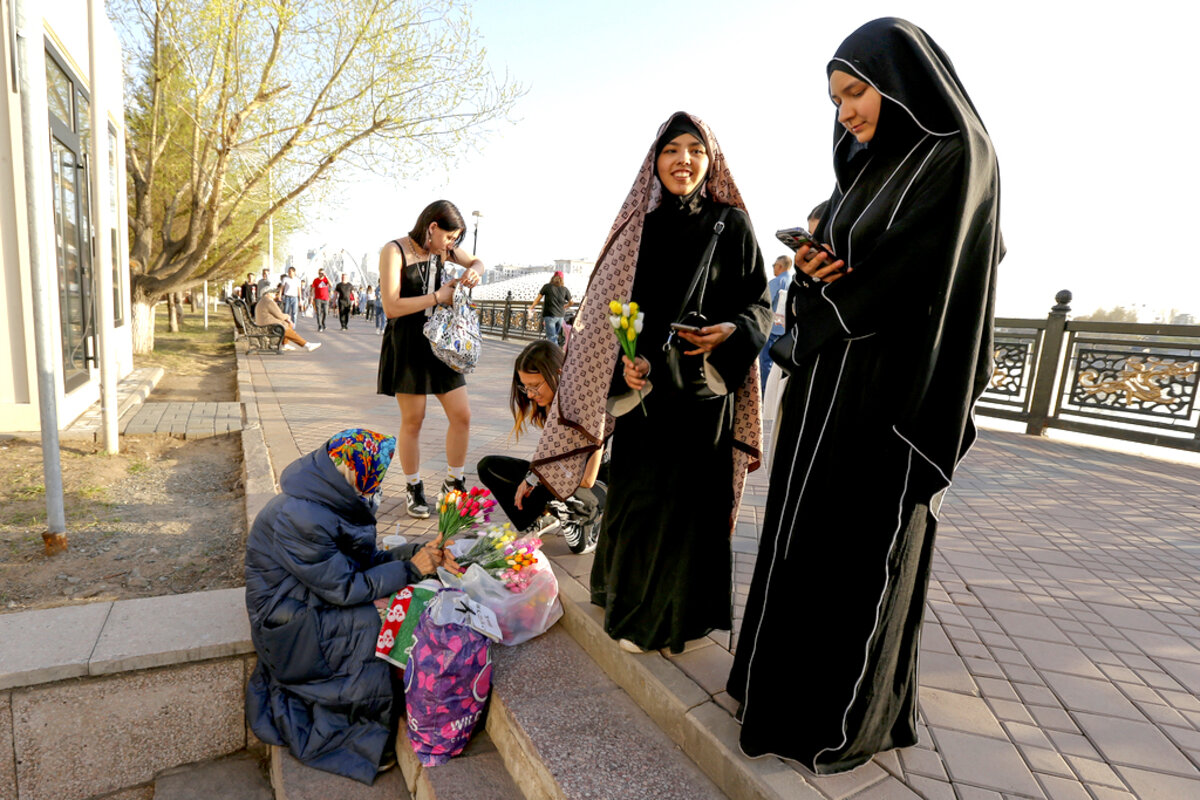
Since late March, much of Eurasia from Armenia to Mongolia has been transfixed by a court case of a former top official in Kazakhstan who killed his wife. On May 13, the man was sentenced to 24 years in prison. Not only was his violent action caught on camera, but the trial was also livestreamed – a first in Kazakhstan – for millions to watch.
More than two-thirds of Kazakhs followed the trial over six weeks. Even a famous Russian TV news presenter was in the courtroom, writing on social media that a “quiet revolution” was taking place in Kazakhstan, a country of some 20 million at the heart of Eurasia.
In a region not strong on women’s rights and equality before the law, the trial of Kuandyk Bishimbayev, once a member of Kazakhstan’s political elite, had an impact even before the guilty verdict. The legislature passed a law – widely known as “Saltanat’s Law,” for the first name of Mr. Bishimbayev’s wife – that criminalizes domestic violence. The law takes effect June 15.
In another sign of progress in a largely patriarchal society, both the judge and the prosecutor were women. “Family and domestic violence is a pressing problem,” prosecutor Aizhan Aimaganova told Tengrinews. “I hope that after this trial, women will realize that going to law enforcement is not useless.”
An estimated 80% of women of working age in Kazakhstan have been victims of domestic abuse. Only 2 out of 10 survivors ever file a case against their offenders.
The slain wife’s brother, Aitbek Amangeldi, told Nikkei Asia that the trial has changed public attitudes, “that is to say, that violence is now becoming unacceptable to society.” According to two scholars writing in Foreign Policy, the trial snapped the people of Kazakhstan “out of their despair and has become a symbol of hope that the law can lead to justice – not just be used by the government to repress dissent.”
Just over half of countries have comprehensive laws addressing domestic violence, according to the World Bank. In Kazakhstan, the trial has not only changed the law but has also led President Kassym-Jomart Tokayev to admit the high level of violence against women and girls – and the need for further work to end it.
“Everyone should be equal before the law,” he said last November after the killing of Saltanat Nukenova. “A just Kazakhstan is a country where law and order triumph.”

A Christian Science Perspective
Each weekday, the Monitor includes one clearly labeled religious article offering spiritual insight on contemporary issues, including the news. The publication – in its various forms – is produced for anyone who cares about the progress of the human endeavor around the world and seeks news reported with compassion, intelligence, and an essentially constructive lens. For many, that caring has religious roots. For many, it does not. The Monitor has always embraced both audiences. The Monitor is owned by a church – The First Church of Christ, Scientist, in Boston – whose founder was concerned with both the state of the world and the quality of available news.
Practical prayers for those affected by floods
- Quick Read
- Read or Listen ( 4 Min. )
-
By Leide Lessa
In the face of recent flooding around the world, each loving thought for the people and areas affected is a healing prayer in support of efforts to rebuild.
Practical prayers for those affected by floods
In the last few months, reports of floods in Asia, Europe, Africa, and the Americas have caught our attention. Since I’m originally from Brazil, I’ve been especially closely following news of the floods being experienced there so that I can pray more effectively.
When we hear about large numbers of people affected in such an event, it’s easy to feel helpless and desperate. But in moments like this, we also see people’s humanity flourish. Volunteers come from afar to engage in whatever rescue work is necessary. They express God-given goodness and creativity, raising funds and collecting food and clothes to support those in need. They overcome fears and extend their hands to help strangers.
For instance, in Rio Grande do Sul, a man got a kayak and started saving people who were trapped because of the flood. He was estimated to have rescued more than 300 people, a few at a time. In an interview with BBC Brasil, he said, “If you’re helping, don’t be depressed. If you’re receiving help, know that you are receiving love. This will keep us together.”
Examples of unselfishness and care such as this inspire us to do whatever we can to help. Throughout my life, I’ve experienced the power of prayer. Prayer leads to action. Prayer supports action. Prayer is healing and practical.
When we are reading the news, prayerful moments help us recognize everyone’s innate ability to express God-given qualities such as resilience, hope, and strength.
Bible accounts demonstrate how practical these qualities are in times of need. For instance, Noah was warned that a flood would come, and he received God’s instruction to build an ark for his family and the animals. When the flood came, they were all safe in the ark and stayed there until there was no more flood.
The ark can be viewed as a symbol for God’s protection, as Mary Baker Eddy, the founder of the Monitor, explains in her book “Science and Health with Key to the Scriptures.” Her definition of “ark” in its Glossary includes “safety,” and “God and man coexistent and eternal; Science showing that the spiritual realities of all things are created by Him and exist forever” (p. 581).
This spiritual concept of ark shows how we can pray for the safety of those affected by floods. Spiritually speaking, they are forever protected by God, who is divine Love. Because everyone coexists eternally with God, even in the face of their seeming losses those affected can feel inner peace, hope, and strength to rebuild their lives.
Divine Science helps us see beyond the human picture into the spiritual reality of existence. In that spiritual reality, God’s creation is harmonious, peaceful, and harmless. The understanding of God’s harmonious creation brings solutions and transforms chaos into peace. Knowing this to be true is a prayer for the affected communities.
All that divine Love creates is loving, balanced, and controlled. God doesn’t punish, doesn’t take away, doesn’t lose control. God only blesses. Accepting this truth for everyone is a prayer that helps to rebuild lives and structures, and to restore homes and jobs.
Rebuilding may not be easy, but it can be successful. Another Bible example comes from Nehemiah, who was distressed because the wall that protected Jerusalem was in ruins and needed to be rebuilt. After receiving permission from the king of Persia, he went to the city and asked the Jews there to help him rebuild the wall. They accepted. But some individuals who heard about this tried to interfere with the work, so much so that the workers had to protect themselves, working with one hand and holding a weapon in the other hand (see Nehemiah 4:17).
In today’s rescuing and rebuilding, the best “weapons” to fight discouragement and despair are courage, hope, and the expectancy of good in overcoming challenges. These weapons are spiritually mighty because they come from God, divine Love, and they don’t wear out. When the situation feels daunting, we can stand up strong through the power of the Almighty, who always renews our strength.
Knowing that disasters don’t come from divine Love, along with recognizing that God, divine Mind, is the source of all intelligence, helps us to see that humankind is capable of collectively rebuilding wisely and according to today’s demands. Such rebuilding is accomplished through demonstrating the intelligence, honesty, and integrity that are ours as children of God. Our practical prayers help everyone.
Spiritually strengthened rebuilding is easier than trying to proceed without God. Let us unite in prayer based on the spiritual reality that divine Love creates all good and maintains everyone in harmony and safety.
Para ler este artigo em português, clique aqui.

Viewfinder
Wedding colors

A look ahead
Thanks for reading. Come back tomorrow, when we’ll take that community theme global. The West Bank village of Farkha, with its communal philosophy and success in self-sufficiency, is keeping afloat. But residents say that amid occupation and war, it takes more than a village.



